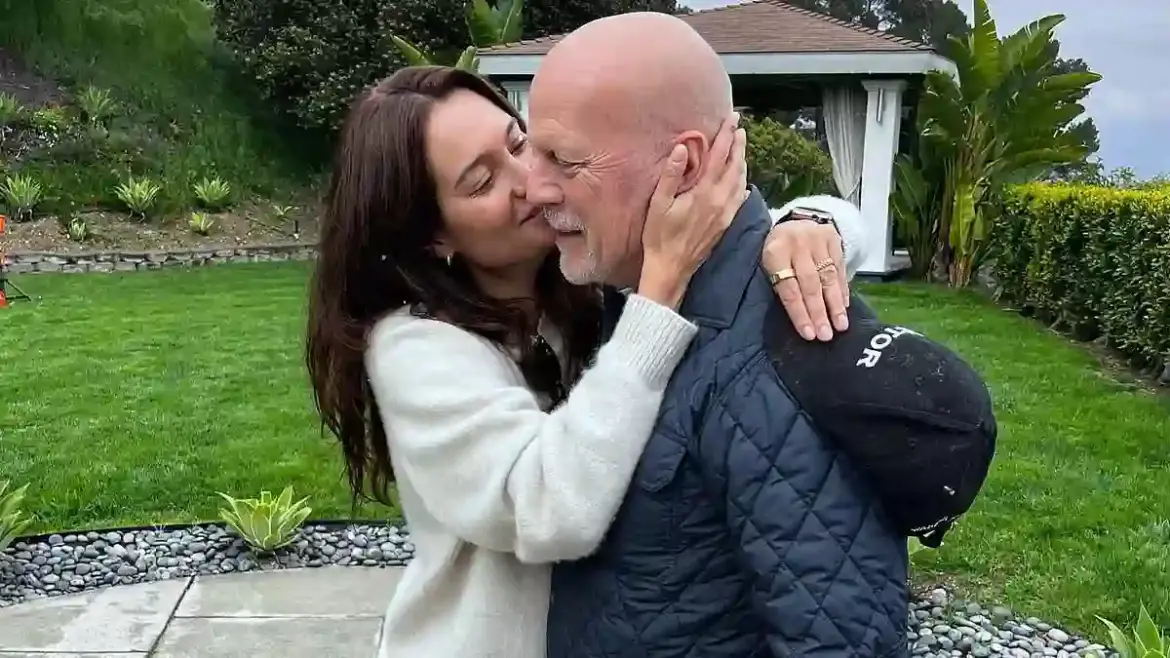When Bruce Willis was diagnosed with frontotemporal dementia in 2023, it marked the beginning of a challenging new chapter for the Hollywood star and his family.
His wife, Emma Heming, has been at the center of tough decisions—decisions that have drawn public scrutiny.
But Heming, 47, is standing firm, emphasizing that her choices are rooted in love and the wellbeing of their family.
Moving Bruce for Safety and Family Wellbeing
During a recent appearance on Good Morning America, Heming addressed criticism about moving Willis out of their family home.
“It was the safest and best decision—not just for Bruce, but also for our two young girls,” she told Michael Strahan.
She made it clear that her decision isn’t up for debate, stressing that the move ensures Willis receives full-time care while protecting their daughters, Mabel, 13, and Evelyn, 11.
“Now I know that Bruce has the best care 100% of the time. His needs are met 100% of the time, as well as our two young daughters.
So I’m not gonna take a vote on that,” Heming added.
The Reality of Frontotemporal Dementia
Frontotemporal dementia, or FTD, affects personality, behavior, and language, gradually eroding cognitive abilities.
Unlike Alzheimer’s, memory loss isn’t immediate—patients experience profound changes in how they think and interact.
FTD is rare, accounting for about one in 20 dementia cases, affecting roughly 50,000 to 60,000 Americans, compared to over six million with Alzheimer’s.
Heming reflected on the first signs she noticed in Willis.
“For someone who is really talkative, very engaged, he was just a little more quiet… he began losing words, and a stutter he dealt with as a child returned,” she recalled.
Despite these challenges, she emphasized that “Bruce is still very mobile… it’s just his brain that is failing him.”
Facing Judgment as a Caregiver
Heming also discussed the unfair scrutiny caregivers often endure.
“Caregivers are so judged, and it just goes to show that people sometimes just have an opinion versus really having the experience,” she said while promoting her new book, The Unexpected Journey.
She explained that dementia manifests differently in every household.
“If you’ve seen one case of dementia, it’s one case of dementia.
You have to do what is right for your family and what is going to keep your loved one safe, as well as your young children.”
Learning to Ask for Help
A neurologist’s insight was a wake-up call for Heming: caregivers often burn out before the people they care for.
“I’m not a failure because I need help. It’s okay for me to raise my hand,” she admitted.
“I really needed permission for someone to tell me that it’s okay to get help.”
Her book aims to provide that reassurance. “I hope this book gives caregivers permission to care for themselves.
Because if they don’t, how will they be able to continue to care for the person that they love?”
Creating a Home for Bruce’s Needs
In an ABC special, Emma and Bruce Willis: The Unexpected Journey, Heming shared that Willis now lives in a one-story home specifically suited to his needs. “Bruce would want that for our daughters.
He would want them to be in a home that was more tailored to their needs, not his needs,” she explained to Diane Sawyer.
The family maintains strong connections, with the girls visiting for meals and spending quality time together.
Heming said, “It’s just really about being able to be there, and connect with Bruce. It is a house that is filled with love, warmth, care, and laughter.
It’s beautiful to see how many of Bruce’s friends continue to show up for him.”
Wondering About His Feelings
Heming shared the questions she wishes she could ask her husband today.
“How’s he doing? Does he feel okay? If there’s anything we could do to support him better… if he’s scared, if he’s worried.
I would really love to have a conversation with him.”
Willis also shares adult daughters Rumer, 37, Scout, 34, and Tallulah, 31, with ex-wife Demi Moore.
Heming recalled the overwhelming moment when a brain scan confirmed Willis’ diagnosis: “I remember hearing it and just not hearing anything else. It was like I was freefalling.”
Adapting and Finding Gratitude
Despite the challenges, Heming remains positive about their ability to adapt.
“We have a way of communicating with him that is just a different, different way, but I’m grateful. I’m grateful that my husband is still very much here.”
Her book, The Unexpected Journey, released on September 9, offers a deeply personal look at navigating caregiving, love, and resilience in the face of one of life’s hardest diagnoses.
